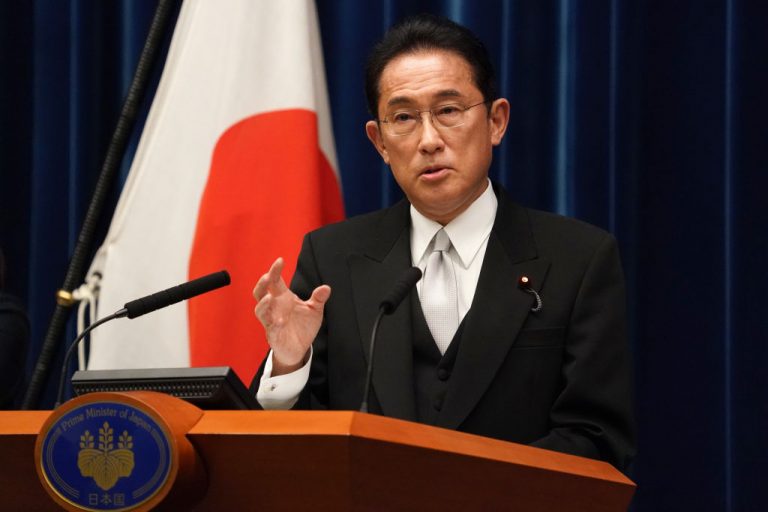While addressing Japanese entrepreneurs on April 26, Chinese ambassador Kong Xuanyou warned Tokyo over a so-called “Cold War mentality”
Kong expressed frustration over the administration of current Japanese Prime Minister Fumio Kishida for his country’s close alignment with Washington on issues regarding China — in particular over the recent confirmation of a security pact between Beijing and the Solomon Islands.
READ MORE:
- Japan Joins Australia and New Zealand in Protest Over China-Solomon Islands’ Security Pact
- Following Confirmed Security Deal, Leaked File Reveals China Intended to Build Naval Base in the Solomon Islands
- US Senators Visit Taiwan, Prompting Major PLA Military Drills Near Island
The meeting, which was held virtually, saw Kong address more than 100 business professionals during a seminar hosted by the Japan-China Investment Promotion Organization – the event was held to commemorate the 50th anniversary since the forming of diplomatic relations between China and Japan following World War II.
Kong warned during the event that Sino-Japanese relations are currently at a “crossroads,” and urged Tokyo to stop treating Beijing as a rival, which has resulted in an “increasingly hostile public opinion.”
“If some people in Japan are obsessed with a narrow geopolitical vision and the Cold War mentality of confrontation between camps, they will naturally dislike China and regard China as a threat or even an enemy, and embark on the wrong path of pitting itself against its neighbors,” Kong said, according to a statement posted on the website of the People’s Republic of China (PRC) embassy in Tokyo.
The state of bilateral ties has been “far from ideal, with prominent issues both old and new intertwined with each other,” Kong said, adding that, “[Our countries] are at a crossroads, where we either forge ahead or retreat.”
Japan joins Western allies in protest of security deal
Earlier this week, the Solomon Islands confirmed that they had signed a security agreement with China, aimed at “strengthening the Solomons Islands’ police force and diversifying its security outreach.”
Success
You are now signed up for our newsletter
Success
Check your email to complete sign up
Following the announcement, Japan announced the dispatch of a foreign vice-minister to the South Pacific island on April 25 — joining the United States, Australia and New Zealand in protest over concerns that Beijing could establish a military presence in the region.
Kentaro Uesugi’s three-day trip to the Solomons came days after the U.S. sent a senior delegation to the island, and warned that Washington would take “unspecified action,” should the security deal with China pose a threat to the U.S. or its allied interests.
The security pact, which China and the Solomons confirmed on April 19, has elicited fears that the communist regime’s People’s Liberation Army (PLA) could eventually set up a base in the country. The Solomon Islands, home to around 600,000, occupies a stretch of sea around 1,240 miles northeast of Australia.
Although Solomon Islands Prime Minister Mannaseh Sogavare has sought to downplay the significance of the security agreement, and said on multiple occasions that his country won’t host any foreign military bases, many neighboring countries remain worried that the Pacific nation could change its mind.
Contradicting actions
A draft of the pact, which was leaked online, revealed that Chinese warships could stop in the Solomon Islands at any time, and that China’s People’s Liberation Army (PLA) could also deploy armed forces there “to assist in maintaining social order.” The leaked file also revealed that the PLA had intentions of building a military base in the South Pacific island as early as 2020.
Japanese Foreign Minister Yoshimasa Hayashi said during Tuesday’s meeting that Sogavare had again confirmed that he had no intentions of allowing China to build any military bases in his country.
Taiwan
Yesterday, Beijing accused the U.S. navy of deliberately “undermining peace and stability” by sending a destroyer through the Taiwan Strait.
The U.S. 7th fleet responded with a statement saying that the “Arleigh Burke-class guided-missile destroyer USS Sampson conducted a routine operation through the strait on April 26.”
“The ship’s transit through the Taiwan Strait demonstrates the United States’ commitment to a free and open Indo-Pacific,” the statement read, adding that, “The United States military flies, sails, and operates anywhere international law allows.”
Although the U.S. has no formal diplomatic ties with Taipei — officially the Republic of China (ROC) — it continues to supply arms to the self-ruling island and regularly sends warships through the Taiwan Strait, triggering condemnation from Beijing, which claims Taiwan as a rightful part of its territory, and has vowed to reclaim it by any means necessary.
Japan has also stepped up support for Taiwan in recent months, with more Taiwanese expressing confidence that Tokyo would come to its aid in the event of a mainland invasion, than those who think the U.S. would do the same.














